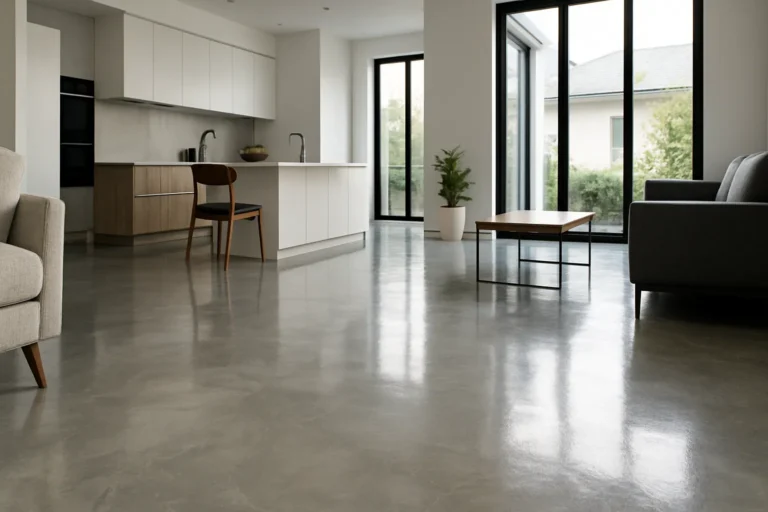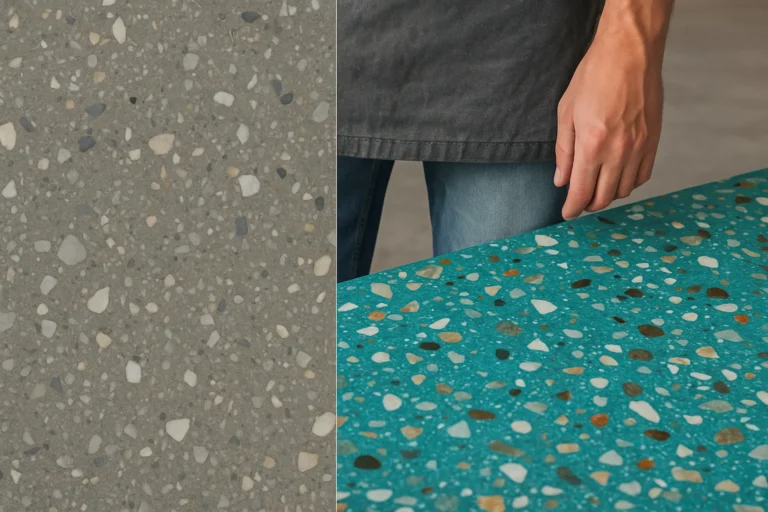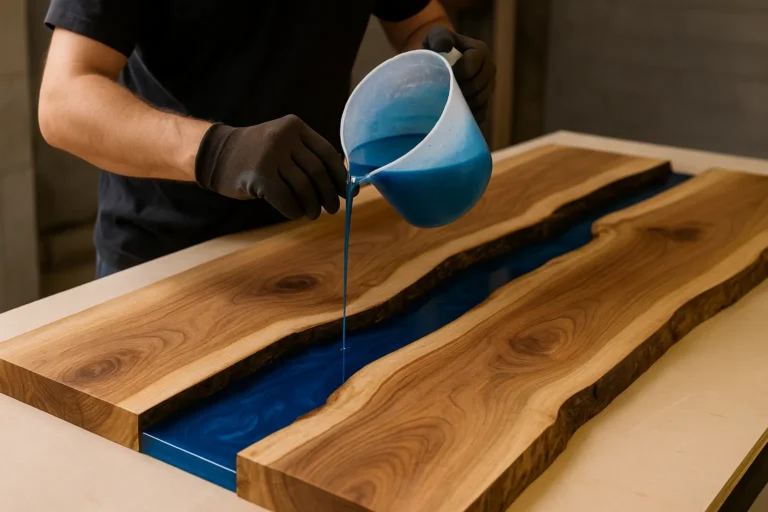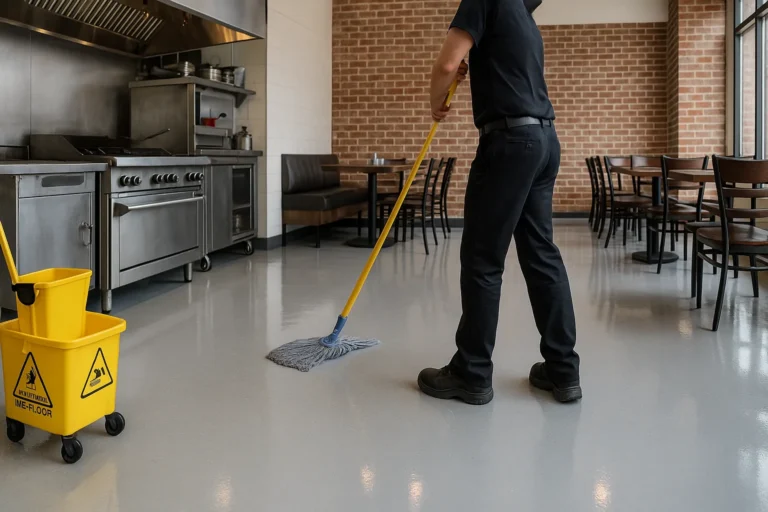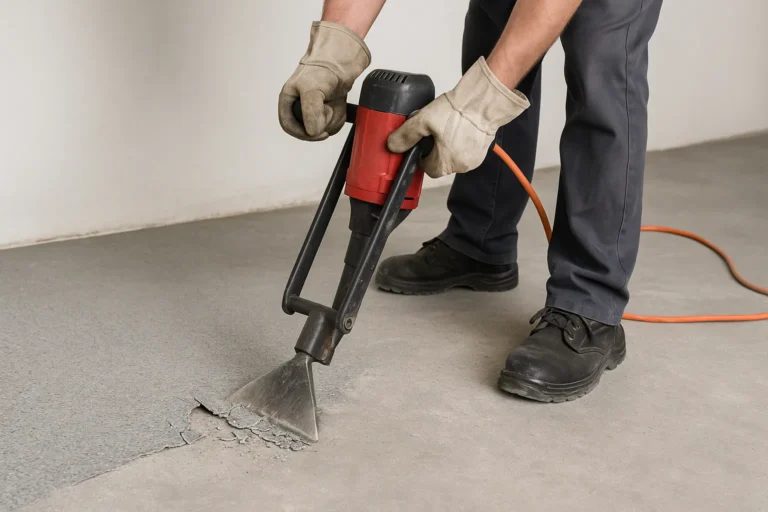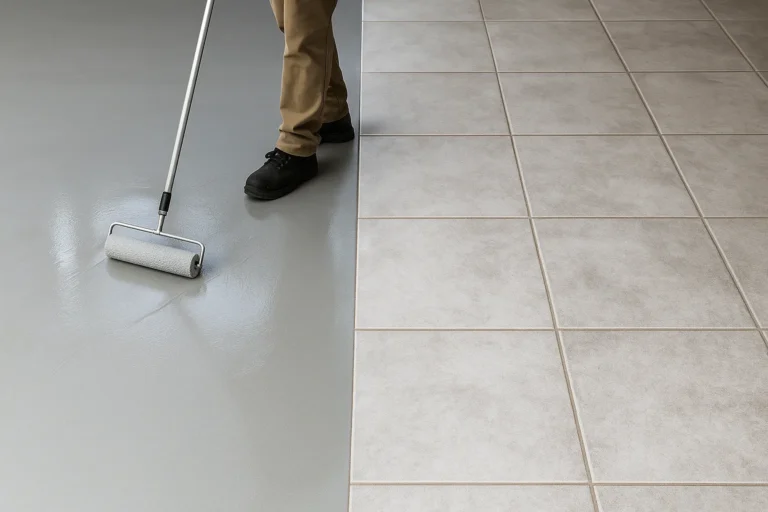Concrete is a durable and versatile material used in various construction projects, from driveways to patios and indoor flooring. However, to maintain its strength and appearance, concrete often requires protection from the elements and daily wear and tear. This is where concrete sealers come into play. In this comprehensive guide, we’ll explore everything you need to know about concrete sealers, helping you make informed decisions for your next project.
What is a Concrete Sealer?
A concrete sealer is a protective coating applied to concrete surfaces to enhance their durability, appearance, and resistance to various environmental factors. These sealers act as a barrier, preventing moisture, chemicals, and other potentially harmful substances from penetrating the concrete’s porous structure.
Types of Concrete Sealers
There are several types of concrete sealers available, each with its own unique properties and applications:
- Penetrating sealers: These sealers penetrate the concrete surface, forming a chemical barrier within the pores.
- Topical sealers: Applied to the surface of the concrete, these sealers form a protective film.
- Acrylic sealers: Known for their quick drying time and UV resistance, acrylic sealers are popular for both indoor and outdoor use.
- Epoxy sealers: Offering excellent durability and chemical resistance, epoxy sealers are ideal for high-traffic areas.
- Polyurethane sealers: These sealers provide superior abrasion and chemical resistance, making them suitable for industrial applications.
Benefits of Using Concrete Sealers
Applying a concrete sealer offers numerous advantages:
- Protection against stains and spills
- Increased resistance to freeze-thaw cycles
- Enhanced color and appearance of the concrete
- Reduced dust accumulation
- Extended lifespan of the concrete surface
- Easier maintenance and cleaning
By using a high-quality concrete sealer, you can significantly improve the longevity and appearance of your concrete surfaces, saving time and money on repairs and replacements in the long run.
Choosing the Right Concrete Sealer
Selecting the appropriate concrete sealer for your project is crucial to achieving the desired results. Consider the following factors when making your decision:
Factors to Consider
- Location of the concrete (indoor or outdoor)
- Type of traffic the surface will experience
- Desired appearance (matte, glossy, or natural)
- Climate and weather conditions
- Existing concrete condition
- Budget constraints
Topcoat Selection Guide
To help you choose the right topcoat for your concrete sealer, consider the following table:
| Surface Type | Recommended Topcoat |
| Driveways | Epoxy or Polyurethane |
| Patios | Acrylic or Penetrating |
| Garage Floors | Epoxy or Polyaspartic |
| Pool Decks | Acrylic or Silane/Siloxane |
| Countertops | Food-grade Epoxy or Polyurethane |
Remember that the best sealer for your project may depend on specific requirements and conditions. Consult with a professional or the manufacturer for personalized recommendations.
Concrete Sealer Application Process
Proper application of concrete sealer is essential for achieving optimal results and ensuring long-lasting protection.
Surface Preparation
Before applying any sealer, it’s crucial to prepare the concrete surface:
- Clean the surface thoroughly, removing dirt, oil, and debris
- Repair any cracks or damage to the concrete
- Allow the surface to dry completely
- Test for moisture content if necessary
Application Techniques
Different sealers may require specific application methods:
- Roller application: Ideal for smooth surfaces and even coverage
- Sprayer application: Suitable for large areas and textured surfaces
- Brush application: Best for small areas or touch-ups
Always follow the manufacturer’s instructions for the best results.
Drying and Curing Time
Drying and curing times can vary depending on the type of sealer used:
- Acrylic sealers: 4-12 hours for drying, 24-48 hours for curing
- Epoxy sealers: 24-72 hours for drying, 7-14 days for full cure
- Penetrating sealers: 2-4 hours for drying, 24-72 hours for curing
Ensure proper ventilation and avoid foot or vehicle traffic during the curing process.
Enhancing Concrete Appearance with Tinted Sealers
Tinted concrete sealers offer an excellent way to enhance the appearance of your concrete surfaces while providing protection.
AcquaTint™ Tinted Sealer
AcquaTint™ is a water-based tinted sealer that offers:
- UV resistance for long-lasting color
- Low VOC content for eco-friendly application
- Easy application and cleanup
- Available in a variety of colors to suit your design preferences
EasyTint™ Tinted Sealer
EasyTint™ is a solvent-based tinted sealer that provides:
- Excellent color enhancement and depth
- Superior durability for high-traffic areas
- Resistance to chemicals and stains
- Quick drying time for faster project completion
Both AcquaTint™ and EasyTint™ can be used to create unique decorative effects on concrete surfaces, adding value and visual appeal to your projects.
Water-Based vs. Solvent-Based Concrete Sealers
When choosing a concrete sealer, you’ll often encounter water-based and solvent-based options. Each type has its own advantages and considerations.
AcquaSeal™ Water-Based Sealer
AcquaSeal™ is a high-performance water-based sealer that offers:
- Low odor and VOC content
- Easy application and cleanup
- Excellent UV resistance
- Environmentally friendly formulation
Water-based sealers like AcquaSeal™ are ideal for indoor applications or areas with limited ventilation.
EasySeal™ Solvent-Based Sealer
EasySeal™ is a solvent-based sealer that provides:
- Superior penetration and adhesion
- Excellent resistance to chemicals and abrasion
- Enhanced color and gloss
- Faster drying time compared to water-based sealers
Solvent-based sealers like EasySeal™ are often preferred for outdoor applications or areas requiring maximum durability.
Maintaining Sealed Concrete Surfaces
Proper maintenance is essential for preserving the appearance and protective qualities of sealed concrete surfaces.
Cleaning and Reapplication
To maintain sealed concrete:
- Clean regularly with mild soap and water
- Avoid harsh chemicals or abrasive cleaning tools
- Reapply sealer as needed (typically every 2-5 years)
- Address any damage or wear promptly
Troubleshooting Common Issues
Some common issues with sealed concrete and their solutions include:
- Peeling or flaking: Remove loose sealer, clean the surface, and reapply
- Cloudy appearance: Ensure proper application technique and avoid over-application
- Discoloration: Use UV-resistant sealers for outdoor applications
- Bubbling: Apply sealer in thin, even coats and avoid application in direct sunlight
Concrete Sealer Safety and Environmental Considerations
When working with concrete sealers, it’s important to prioritize safety and environmental responsibility.
VOC Content and Regulations
Volatile Organic Compounds (VOCs) are chemicals that can be harmful to human health and the environment. Many regions have regulations limiting VOC content in concrete sealers. Choose low-VOC or VOC-compliant products when possible, especially for indoor applications.
Personal Protective Equipment
When applying concrete sealers, use appropriate personal protective equipment (PPE):
- Respirator or mask
- Safety goggles
- Chemical-resistant gloves
- Protective clothing
Always work in well-ventilated areas and follow the manufacturer’s safety guidelines.
Specialized Concrete Sealers for Specific Applications
Certain concrete surfaces may require specialized sealers to address specific needs or challenges.
Slip-Resistant Concrete Sealers
For areas prone to moisture or where slip resistance is crucial, such as pool decks or outdoor walkways, consider sealers with added texture or anti-slip additives. These products enhance safety without compromising on protection or appearance.
Penetrating Concrete Sealers
Penetrating sealers are ideal for:
- Historic preservation projects
- Surfaces requiring a natural, matte finish
- Areas exposed to freeze-thaw cycles
- Concrete that will be painted or stained later
These sealers offer excellent protection without altering the surface appearance significantly.
Concrete Sealer Coverage and Cost Considerations
Understanding coverage rates and cost factors can help you budget effectively for your concrete sealing project.
Coverage Calculator
To estimate the amount of sealer needed, use this simple formula:
Total square footage ÷ Coverage rate per gallon = Number of gallons needed
Remember to factor in multiple coats if required by the product specifications.
Cost-Effectiveness Analysis
When evaluating the cost-effectiveness of concrete sealers, consider:
- Initial product cost
- Coverage rate
- Durability and lifespan
- Maintenance requirements
- Potential savings on repairs and replacements
Investing in a high-quality sealer may result in long-term savings due to reduced maintenance and extended concrete lifespan.
Concrete Sealer Warranties and Performance Guarantees
Many reputable manufacturers offer warranties or performance guarantees for their concrete sealers. These can provide peace of mind and protection for your investment. When reviewing warranties, consider:
- Duration of coverage
- Specific conditions covered
- Application requirements for warranty validity
- Exclusions or limitations
Always follow the manufacturer’s guidelines to ensure your sealer application is eligible for warranty coverage.
Innovations in Concrete Sealer Technology
The concrete sealer industry continues to evolve, with new technologies offering improved performance and sustainability.
Self-Healing Sealers
Self-healing sealers contain special polymers that can repair minor damage or scratches automatically. This technology helps maintain the integrity of the protective layer, extending the life of the sealer and reducing maintenance needs.
Nanotechnology in Concrete Protection
Nanotechnology-based concrete sealers offer several advantages:
- Enhanced penetration into concrete pores
- Improved resistance to water and chemicals
- Increased durability and longevity
- Potential for self-cleaning properties
As these technologies continue to develop, we can expect even more advanced and effective concrete sealer solutions in the future.
FAQs
What are the different types of concrete sealers?
The main types of concrete sealers include penetrating sealers, topical sealers, acrylic sealers, epoxy sealers, and polyurethane sealers. Each type offers unique properties and benefits, catering to different application needs and surface requirements. The choice of sealer depends on factors such as the location of the concrete, desired appearance, and level of protection required.
How long does concrete sealer last?
The lifespan of concrete sealer varies depending on the type of sealer, application method, and environmental conditions. Generally, penetrating sealers can last up to 10 years, while topical sealers may need reapplication every 2-5 years. Factors such as UV exposure, traffic, and maintenance practices can affect the longevity of the sealer. Regular inspections and proper maintenance can help extend the life of your concrete sealer.
Can you apply concrete sealer over existing sealer?
In most cases, it is possible to apply concrete sealer over existing sealer, but proper preparation is crucial. The existing sealer must be in good condition, free of peeling or flaking. Clean the surface thoroughly and perform a compatibility test with the new sealer. Some sealers may require the complete removal of the old sealer before application. Always consult the manufacturer’s guidelines and consider professional advice for best results when resealing concrete surfaces.
